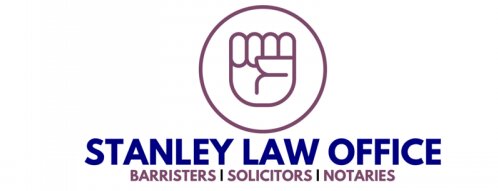Best Work Permit Lawyers in Canada
Share your needs with us, get contacted by law firms.
Free. Takes 2 min.
Or refine your search by selecting a city:
List of the best lawyers in Canada
About Work Permit Law in Canada
Canada offers numerous opportunities for foreign nationals to work within its borders through work permits. A work permit is an official document that allows a foreign individual to work legally in Canada. There are two main types of work permits: the employer-specific work permit, which lets you work according to the conditions set in your permit, and the open work permit, which is not job-specific allowing the holder greater flexibility. Obtaining a work permit is crucial for anyone who wishes to engage in paid employment in Canada and is often a part of broader immigration aspirations.
Why You May Need a Lawyer
While applying for a work permit in Canada can sometimes be straightforward, there are numerous scenarios where legal assistance might be necessary. Common situations include navigating complex immigration regulations, dealing with denied applications, addressing employer-specific legal issues, or clarifying the terms and conditions of work arrangements. A lawyer can also help in understanding the implications of your work permit on long-term immigration goals, ensuring compliance with Canadian law, and representing you in cases of disputes or legal challenges.
Local Laws Overview
Canadian work permit laws are governed under the Immigration and Refugee Protection Act and Regulations. Applicants must meet specific criteria which can vary depending on the type of permit being applied for. Employer-specific work permits require you to work for a designated employer listed in your permit, while open work permits provide more flexibility but may have specific eligibility criteria. Laws are enforced by Immigration, Refugees and Citizenship Canada (IRCC) and adherence to conditions is mandatory. Violations can lead to serious consequences, including deportation and future inadmissibility.
Frequently Asked Questions
1. How do I apply for a Canadian work permit?
You can apply online or on paper. The process involves filling out forms, providing documentation such as proof of job offer, and submitting biometrics. You may need a Labor Market Impact Assessment (LMIA) for most employer-specific work permits.
2. Can I work in Canada without a work permit?
Some jobs do not require a work permit, but you must ensure your situation meets the specific exemption criteria established by Canadian law.
3. How long does a work permit last?
The duration of a work permit varies; it can last anywhere from a few months to a few years, depending on the terms of employment and the type of permit issued.
4. What is a Labor Market Impact Assessment (LMIA)?
An LMIA is a document some employers need to obtain before hiring a foreign worker, proving that there's a need for a foreign worker and no Canadian worker is available to do the job.
5. Can my spouse or common-law partner work in Canada if I have a work permit?
Your spouse or common-law partner might be eligible for an open work permit if you hold a valid work or study permit.
6. What are the fees associated with obtaining a work permit?
The standard fee for a work permit application is around CAD 155, with additional fees for biometrics and any LMIA processing.
7. Can I extend my work permit?
Yes, you can apply to extend your work permit before it expires, but it's important to apply at least 30 days before your current permit expires.
8. How does a work permit affect my ability to apply for permanent residency?
A Canadian work permit can aid in obtaining permanent residency as it provides work experience in Canada, a valuable asset for various immigration programs.
9. Can I change employers with a work permit?
If you hold an employer-specific work permit, you'll need to apply for a new permit or amendment if changing employers unless you have an open permit.
10. What happens if my work permit application is refused?
If refused, you can find out the reasons from the immigration officer and potentially re-apply with a new or adjusted application.
Additional Resources
Several resources can aid individuals seeking legal advice or information about Canadian work permits:
- Immigration, Refugees and Citizenship Canada (IRCC)
- Employment and Social Development Canada (ESDC)
- Provincial Immigration Websites
- Regulated Canadian Immigration Consultants (RCIC)
These organizations provide guidelines, application details, and updates on any changes in the law.
Next Steps
If you need legal assistance with your work permit, consider the following steps:
1. Collect all pertinent documentation: job offer, passport, previous permits.
2. Identify your specific legal needs or questions.
3. Seek a consultation with a certified Immigration lawyer or a Regulated Canadian Immigration Consultant (RCIC).
4. Understand the fee structures and choose a professional whose expertise aligns with your specific needs.
Taking these steps can ensure that you navigate the complexities of the Canadian work permit system effectively and increase your chances of a successful application.
Lawzana helps you find the best lawyers and law firms in Canada through a curated and pre-screened list of qualified legal professionals. Our platform offers rankings and detailed profiles of attorneys and law firms, allowing you to compare based on practice areas, including Work Permit, experience, and client feedback.
Each profile includes a description of the firm's areas of practice, client reviews, team members and partners, year of establishment, spoken languages, office locations, contact information, social media presence, and any published articles or resources. Most firms on our platform speak English and are experienced in both local and international legal matters.
Get a quote from top-rated law firms in Canada — quickly, securely, and without unnecessary hassle.
Disclaimer:
The information provided on this page is for general informational purposes only and does not constitute legal advice. While we strive to ensure the accuracy and relevance of the content, legal information may change over time, and interpretations of the law can vary. You should always consult with a qualified legal professional for advice specific to your situation.
We disclaim all liability for actions taken or not taken based on the content of this page. If you believe any information is incorrect or outdated, please contact us, and we will review and update it where appropriate.
Browse work permit law firms by city in Canada
Refine your search by selecting a city.















